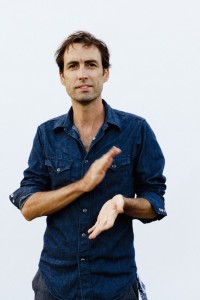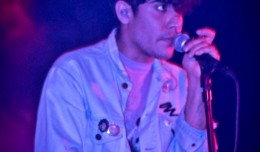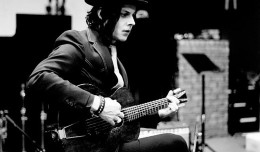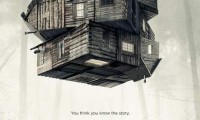In many ways, Andrew Bird is an enigma. In some circles, his name is synonymous with “musical genius,” yet both his music and personality could be described as understated. His nine to five takes place in a barn (he’s not a farmer). He enjoys isolation when writing music – which (somewhat ironically) helps him create beautiful, flowing melodies that often end up bringing people together. He is never done “writing” his songs, as he continues to improvise and change them from show to show. And he is an excellent whistler.
Famous for his multi-instrumentalism combined with his ability to weave music from multiple instruments and various sounds together in a one-man live show, he began playing the violin at the age of four and has never worked a traditional job. Now, with his recently released album, “Break It Yourself,” racking up critical acclaim, he will be making a stop at The Fillmore Detroit on May 10, where those that are familiar with his shows will know to expect the unexpected from his characteristically fresh, unscripted and charismatic show.
Recently, iSPY got the chance to catch up with Bird for an exclusive interview where he discussed all these things and the tightrope act/cooking show that makes up his live performance.
What sets your new album apart from your previous albums?
It’s quite different in that the whole record was done live in a barn. It’s a performance, not a production. There are no overdubs. It’s got more live energy.
Was there any particular inspiration for the album?
Just my band, who I’ve never really given a chance to play on a record. They’ve added to records in the past, but my records have been sort of filled by myself one piece at a time and carefully put together, carefully controlled. This one is less controlled. As far as outside influences, I would point to certain records like music from the Big Pink and Modern Lovers. I like that kind of raw quality to a record.
You play so many different instruments. When you are writing a song, do you use any particular instrument to help you with that process?
I’ve got two modes of writing. I’m either making loops with my violin in my barn or I’m sitting on the couch playing guitar. And both of them yield different kinds of ideas, but I think the more unique stuff comes from playing the violin.
Why is a barn is a good place for you to do your performing and such? I’ve heard a lot of people say that it has a nice feel or great acoustics or just kind of a nostalgia. What is its appeal for you?
I guess all those reasons – and isolation is another one. Complete immersion, no distractions. I get up, make coffee, have eggs and play until the sun goes down. You can really get to some places you can’t really get to in a city. I don’t know if I could have made the music I’ve made in the last 10 years without that kind of space. A lot of artists – whether they’re painters or whatever – if they can manage having a country studio, it is chiefly important. You can get into a bit of a vacuum in there in a good way. You can cut off all of your influences and just find out what’s inside of you.
How does your songwriting process work?
Well, no matter where I am on the planet, there’s always stuff percolating under the surface every waking moment. And ever since I was a kid, If I wasn’t eating or talking or sleeping, I’d be whistling. There are always tones and pitches and melodies under the surface, so it’s just a matter of drawing those out and going into ideas and waving a wand and saying now it exists beyond the conscious flow. Reach in, grab some ideas and start building.
How do you know when a song is done?
Well, making the record provides some sort of statement saying that this is what you’re offering to the world. But, for me, I don’t stop writing them. I keep changing them year after year – even after the records come out – and part of that is in order to kind of pinch myself every night because you’ve got to play these songs every night. The worst feeling is when you’re out there making all of these sacrifices and working, putting everything out there and not being inspired or starting to go numb – which can happen when you’re playing every night. You have to […] mix things up and make things more precarious. You have to think on your feet and improvise. I see bands that are sticking to the script of their records, but I find those shows really boring and I just couldn’t do that.
Your sound is described in so many different ways – from gypsy to folk and more. How would you describe your sound?
I don’t know. Again, that would have the effect [of making me feel] pinned down. My audience has come to expect the unexpected. People don’t come to my shows to hear the hits played as they know them – at least I don’t think so. I’m writing pop songs, but they’re more off the cuff and more improvised than most pop songs and a little more experimental and odd or outside the formula.
What drew you to music at such a young age?
Well, I love it. I was four years old when I began playing the violin, but I was not an unwilling participant. I was pretty into it. No four year old is going to really have the kind of concentration it takes to master an instrument. It’s kind of all fun and games, and, the next thing you know, you’re eight years old and you can play pretty well. And I was lucky. My folks didn’t push me that hard. It was just part of my daily life. I’d practice and play and over the years it became more and more important to me. I’ve been doing it so long I don’t even think of myself of a musician, but it does dominate every part of my life.
Did you ever consider a different career or did you always know that this would be what you did for a living?
I didn’t think I was going to become a professional musician for a living, which was kind of healthy, I think. There were times where I got so focused that it was like squeezing everything out – and that wasn’t good for my music. That’s why I became a songwriter. You can put all of your experiences into a song. A song is like directing a movie or writing a script. It’s a more broad medium than simply being a violinist. I feel like I’ve got more to offer than just being a player, but it wasn’t until I was 18 or 19 that I started to think about doing it professionally. I can almost say I’ve never had a day job. I scraped by teaching and playing wedding gigs when I was 19, 20, 21 – just making enough to barely pay rent. I started touring when I was 23, and was barely paying rent for most of my 20s, and somewhere in there things started to actually click. But it took a long, long time. When I was little had imagined where I might be. I thought I wanted to be a psychiatrist when I was eight or nine years old. I liked the décor of the psychiatrist’s office – the mahogany.
What is the greater purpose of music or the greater place in the world that musicians have?
I think that what I do – playing in a different town every night, and these people come out of their houses and come together – it’s like a social conduit. It gets people out and talking to each other and helps people find their friends in a way, and that’s nothing I ever planned on it being, but I think it’s pretty cool when people come to me after the show and say, “We met because of your music” or “My folks and I can at least agree on your music.” I never really expected that kind of effect. I was just kind of pursing how I could realize the music that’s in my head. It was social for me at first when I got out of classical music to go play in a rock band and play Irish music sessions. That’s kind of what got me going on the whole thing, but then I got very single minded and more and more immersed in it and kind of emotional about the whole thing. It’s funny that something as isolating as music has this effect on other people – bringing people together. That’s probably the coolest thing you can see happen.
You’re going to be coming to Detroit in May. You came through Ann Arbor last summer. Do you have any fond memories or favorite hangouts in the area?
Ya – I spent some time in Ypsilanti. My manager used to live there. There’s kind of a funky little music store in Ypsilanti, and the train yards … It’s a cool little town. Ann Arbor is, as far as college towns go, pretty well rounded. Sometimes college towns can be a little bit … well, a certain way. Ann Arbor is a pretty cool place. I know a lot of musicians have moved to Detroit and kind of helped revitalize the neighborhoods. […] There’s a whole community of musicians there, so maybe I’ll get a chance to check that out.
What can those who have never seen you perform live expect from your Detroit show?
I think to the uninitiated, it looks like I’m working pretty hard up there. There’s a lot going on. You can close your eyes and just listen, but if you open your eyes, you see a bit of a balancing act with a lot of on-the-fly looping. So, you can entertain yourself with “Where is that sound coming from?” and “How did that sound get made?” because there’s a lot of sounds being made live. People think that they’re pre-recorded samples, and there’s nothing like that. But you could also just close your eyes and let it wash over you. It’s a high wire act of sorts. I like to compare it to a very insane cooking show where I’m stumbling around, spilling things and forgetting to add some of the ingredients and throwing it in at the last minute.























